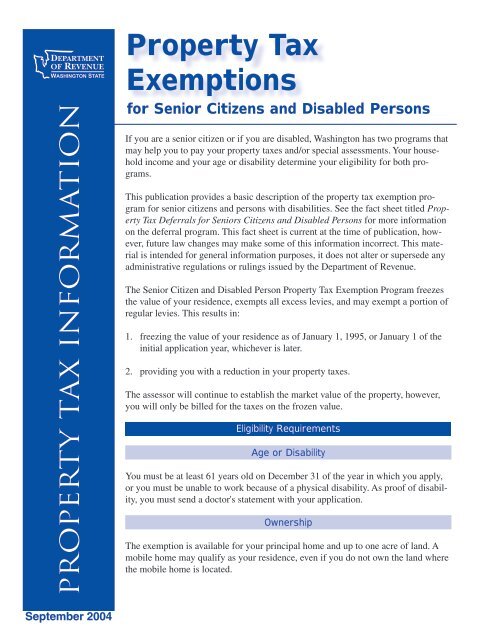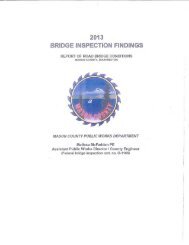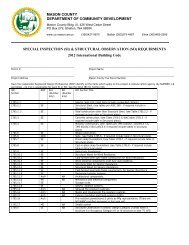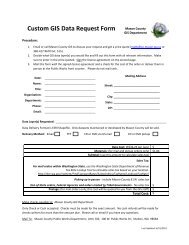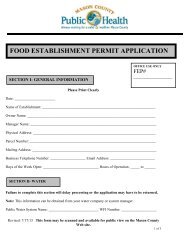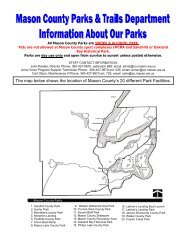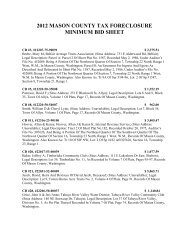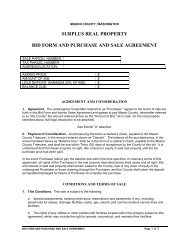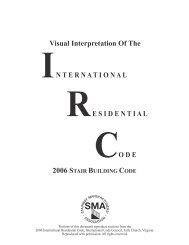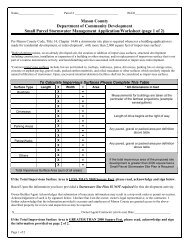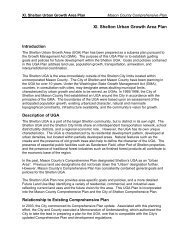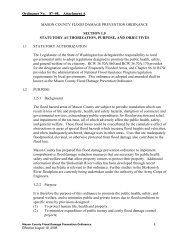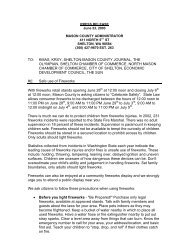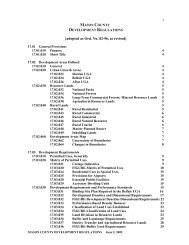Property Tax Exemptions for Senior Citizens and ... - Mason County
Property Tax Exemptions for Senior Citizens and ... - Mason County
Property Tax Exemptions for Senior Citizens and ... - Mason County
You also want an ePaper? Increase the reach of your titles
YUMPU automatically turns print PDFs into web optimized ePapers that Google loves.
<strong>Property</strong> <strong>Tax</strong> In<strong>for</strong>mation<br />
<strong>Property</strong> <strong>Tax</strong><br />
<strong>Exemptions</strong><br />
<strong>for</strong> <strong>Senior</strong> <strong>Citizens</strong> <strong>and</strong> Disabled Persons<br />
If you are a senior citizen or if you are disabled, Washington has two programs that<br />
may help you to pay your property taxes <strong>and</strong>/or special assessments. Your household<br />
income <strong>and</strong> your age or disability determine your eligibility <strong>for</strong> both programs.<br />
This publication provides a basic description of the property tax exemption program<br />
<strong>for</strong> senior citizens <strong>and</strong> persons with disabilities. See the fact sheet titled <strong>Property</strong><br />
<strong>Tax</strong> Deferrals <strong>for</strong> <strong>Senior</strong>s <strong>Citizens</strong> <strong>and</strong> Disabled Persons <strong>for</strong> more in<strong>for</strong>mation<br />
on the deferral program. This fact sheet is current at the time of publication, however,<br />
future law changes may make some of this in<strong>for</strong>mation incorrect. This material<br />
is intended <strong>for</strong> general in<strong>for</strong>mation purposes, it does not alter or supersede any<br />
administrative regulations or rulings issued by the Department of Revenue.<br />
The <strong>Senior</strong> Citizen <strong>and</strong> Disabled Person <strong>Property</strong> <strong>Tax</strong> Exemption Program freezes<br />
the value of your residence, exempts all excess levies, <strong>and</strong> may exempt a portion of<br />
regular levies. This results in:<br />
1. freezing the value of your residence as of January 1, 1995, or January 1 of the<br />
initial application year, whichever is later.<br />
2. providing you with a reduction in your property taxes.<br />
The assessor will continue to establish the market value of the property, however,<br />
you will only be billed <strong>for</strong> the taxes on the frozen value.<br />
Eligibility Requirements<br />
Age or Disability<br />
You must be at least 61 years old on December 31 of the year in which you apply,<br />
or you must be unable to work because of a physical disability. As proof of disability,<br />
you must send a doctor's statement with your application.<br />
Ownership<br />
The exemption is available <strong>for</strong> your principal home <strong>and</strong> up to one acre of l<strong>and</strong>. A<br />
mobile home may qualify as your residence, even if you do not own the l<strong>and</strong> where<br />
the mobile home is located.<br />
September 2004
The property must be your principal home at the<br />
time you apply <strong>for</strong> the exemption. You must occupy<br />
the home <strong>for</strong> at least six months each year.<br />
Your residence may qualify even if you are temporarily<br />
in a hospital, nursing home, boarding home,<br />
or adult family home. You may rent your residence<br />
to someone else during your hospital, nursing<br />
home, boarding home, or adult family home stay,<br />
if the income is used to pay the hospital, nursing<br />
home, boarding home, or adult family home costs.<br />
<strong>Property</strong> used as a vacation home is not eligible <strong>for</strong><br />
the exemption program.<br />
You must own the home <strong>for</strong> which the exemption<br />
is claimed, either in total (fee owner), as a contract<br />
purchaser, mortgagee, deed of trust, or as a life<br />
estate (including a lease <strong>for</strong> life). If you transfer<br />
your home under a revocable trust agreement, you<br />
must retain the full use of the property <strong>and</strong> be able<br />
to revoke the trust <strong>and</strong> take ownership at any time.<br />
Irrevocable trusts qualify, if they can be deemed a<br />
life estate.<br />
A home owned by a married couple or by co-tenants<br />
is considered owned by each spouse or co-tenant.<br />
Only one person must meet the age or disability<br />
requirement.<br />
If you share ownership in a cooperative housing<br />
unit <strong>and</strong> your share represents the specific unit or<br />
portion where you live, you will be eligible <strong>for</strong> the<br />
exemption of your unit.<br />
Leasehold Interest<br />
Household income includes your disposable<br />
income, that of your spouse, <strong>and</strong> any co-tenants. A<br />
co-tenant is a person living in your home who also<br />
has an ownership interest. Household income does<br />
not include:<br />
• the income of a person, other than a spouse,<br />
who does not have ownership interest <strong>and</strong> lives<br />
in your home. However, the application must<br />
show any income the person contributes to the<br />
household.<br />
• the income of a person who has ownership<br />
interest <strong>and</strong> lives elsewhere. However, if<br />
someone living elsewhere has any ownership<br />
interest, the amount of your exemption will be<br />
based on the percentage of your interest in the<br />
property.<br />
Computing Disposable Income<br />
The maximum amount of annual income you may<br />
receive to qualify <strong>for</strong> the exemption is $35,000.<br />
The disposable income you receive during the year<br />
you apply determines your eligibility. (The assessor<br />
will require proof of income.) Disposable<br />
income includes all sources, whether or not they<br />
are taxable <strong>for</strong> federal income tax purposes. Losses<br />
<strong>and</strong> depreciation may not be deducted. Some of<br />
the most common sources of income include:<br />
• Wages, salaries, <strong>and</strong> tips.<br />
• Social Security benefits.<br />
• Railroad retirement benefits.<br />
If your primary residence or the l<strong>and</strong> under your<br />
primary residence is owned by a government entity,<br />
you are eligible <strong>for</strong> a comparable exemption,<br />
if you meet the minimum qualifications.<br />
Household Income<br />
Your annual household income may not exceed<br />
$35,000. If your household income is between<br />
$35,000 <strong>and</strong> $40,000, you may qualify <strong>for</strong> the<br />
deferral program. See the fact sheet titled <strong>Property</strong><br />
<strong>Tax</strong> Deferrals <strong>for</strong> <strong>Senior</strong> <strong>Citizens</strong> <strong>and</strong> Disabled<br />
Persons <strong>for</strong> more in<strong>for</strong>mation about the program.<br />
2<br />
• Pension <strong>and</strong> annuity receipts, including retirement<br />
bonds, Individual Retirement Accounts,<br />
<strong>and</strong> distributions from Keogh plans. An annuity<br />
is a payment of a fixed sum of money<br />
received at regular intervals. Some examples<br />
of annuity payments include unemployment<br />
compensation, disability payments, <strong>and</strong> welfare<br />
receipts (excluding amounts received <strong>for</strong><br />
the care of dependent children).<br />
• Interest <strong>and</strong> dividend receipts.
• Business income. Depreciation <strong>and</strong> business<br />
losses may not be deducted.<br />
• Rental income. Depreciation <strong>and</strong> rental losses<br />
may not be deducted.<br />
• Capital gains.<br />
If you were retired <strong>for</strong> two or more months during<br />
the application year, your household income will<br />
be computed by multiplying the average monthly<br />
disposable income received during the months you<br />
were retired by twelve. If your spouse died be<strong>for</strong>e<br />
November 1 of the application year or you have<br />
a significant change in income that is expected to<br />
last an indefinite period of time, your household<br />
income is computed by multiplying the average<br />
monthly disposable income, after the occurrence,<br />
by twelve.<br />
Deductions from Disposable Income<br />
To determine your disposable income, you may<br />
take deductions <strong>for</strong> the following:<br />
• Capital gains your receive from the sale of<br />
your principal residence, IF the gain is reinvested<br />
in a replacement principal residence.<br />
• Non-reimbursed amounts you pay <strong>for</strong> your<br />
spouse or yourself to live in a nursing home,<br />
boarding home, or adult family home.<br />
• Non-reimbursed amounts paid <strong>for</strong> prescription<br />
drugs <strong>for</strong> yourself or your spouse.<br />
• Insurance premiums <strong>for</strong> Medicare under Title<br />
XVIII of the Social Security Act.<br />
• Non-reimbursed amounts you pay <strong>for</strong> goods<br />
<strong>and</strong> services that allow you or your spouse to<br />
receive in-home care. The care received must<br />
be similar to the care provided by a nursing<br />
home.<br />
• In-home care including medical treatment,<br />
physical therapy, Meals on Wheels (or similar<br />
meal delivery service), <strong>and</strong> household <strong>and</strong><br />
personal care. Personal care includes assistance<br />
with preparing meals, getting dressed, eating,<br />
taking medications, or areas of personal hygiene.<br />
• Special furniture <strong>and</strong> equipment, such as<br />
wheelchairs, hospital beds, <strong>and</strong> oxygen.<br />
<strong>Exemptions</strong><br />
When your annual income <strong>for</strong> the application year<br />
is $35,000 or less, your home will be exempt from<br />
all excess or special levies. Excess or special levies<br />
are in addition to regular levies. They require voter<br />
approval <strong>and</strong> provide money <strong>for</strong> a specific purpose,<br />
such as school bonds <strong>and</strong> maintenance <strong>and</strong> operation<br />
levies.<br />
In addition, when your income is $30,000 or less, a<br />
portion of the regular levy amount may be exempt.<br />
These exemptions are:<br />
• When your household income is $25,000 or<br />
less, you are exempt from regular levies on the<br />
first $60,000 or 60% of your home's assessed<br />
value, whichever is greater.<br />
For example, if your household income is<br />
$12,000 <strong>and</strong> the assessed value of your property<br />
is $150,000, the taxable value of your property is<br />
$60,000 ($150,000 - $90,000 = $60,000). Sixty<br />
percent of $150,000 ($90,000) is greater than<br />
$60,000.<br />
• When your household income is between<br />
$25,001 <strong>and</strong> $30,000, you are exempt from<br />
regular levies of $50,000 or 35 percent of the<br />
assessed value, whichever is greater, not to<br />
exceed $70,000 or assessed value.<br />
For example, if your household income is<br />
$26,000 <strong>and</strong> the assessed value of your property<br />
is $150,000, the taxable value of your property is<br />
$97,500 ($150,000 - $52,500 = $97,500). Thirtyfive<br />
percent of $150,000 ($52,500) is greater than<br />
$50,000, but less than $70,000.<br />
3
Effective Date<br />
The effective date of the exemption is the date the<br />
taxes are paid.<br />
Death of the Applicant<br />
If you pass away be<strong>for</strong>e the taxes are paid, the taxes<br />
will be recalculated to the full assessed amount<br />
of the principal residence on a pro rata basis beginning<br />
the day following the date of the claimant's<br />
death <strong>for</strong> the remainder of the year. Your surviving<br />
spouse may continue to receive the exemption if<br />
he or she is at least 57 years old <strong>and</strong> meets all the<br />
other eligibility requirements.<br />
Sale or Transfer of <strong>Property</strong>/Exemption<br />
If you sell your home be<strong>for</strong>e the taxes are paid, the<br />
exemption will continue through your period of<br />
ownership, provided you pay the portion of taxes<br />
owing <strong>for</strong> your period of ownership <strong>and</strong> the new<br />
owner pays the portion of taxes <strong>for</strong> his/her period<br />
of ownership. If the new owner pays the entire<br />
amount, the taxes will be recalculated without using<br />
the exemption.<br />
If you sell, transfer, or are otherwise displaced<br />
from your residence, you may transfer the exempt<br />
status to a replacement residence. However, you<br />
may not receive an exemption on more than the<br />
equivalent of one residence in any year. When an<br />
exemption is transferred to a new residence, the<br />
value of the new residence is frozen as of January<br />
1 of the year of change.<br />
If you are moving to Washington, you may transfer<br />
an exemption from another state to your new<br />
Washington residence, providing you meet all<br />
other eligibility requirements <strong>and</strong> provide proof of<br />
the exemption.<br />
How to Apply<br />
Your county assessor administers this program.<br />
Applications are available from that office.<br />
When to Apply<br />
You may apply <strong>for</strong> the exemption program during<br />
the year be<strong>for</strong>e the year the taxes are due <strong>and</strong><br />
payable. For example, if you want an exemption<br />
<strong>for</strong> taxes due in 2005, you must apply no later than<br />
December 31, 2004, using your 2004 income.<br />
When your application is filed after the deadline,<br />
you must use the income from the same year as<br />
you would have, if you had filed your application<br />
on time. For example, you would use your 2002<br />
income, <strong>for</strong> a 2002 application to receive the exemption<br />
from the 2003 taxes.<br />
Refunds<br />
If you have paid prior years' taxes because of a<br />
mistake, oversight, or a lack of knowledge, you<br />
may apply <strong>for</strong> a refund by filing an application <strong>for</strong><br />
refund with the county assessor. You must file the<br />
application within three years of the dates the taxes<br />
were paid. Refunds will not be made beyond the<br />
three-year period.<br />
Renewals<br />
After approval, the exemption applies until a new<br />
application is required. This happens:<br />
• at least once every four years (you will be notified<br />
by the county assessor).<br />
• when you sell your property <strong>and</strong> move to a<br />
new home.<br />
Changes in Circumstances<br />
You must file a Change in Status report with the<br />
assessor's office if changes in your income or living<br />
circumstances affect the exemption.<br />
Change of Status reports are available from your<br />
county assessor.<br />
4
Appeal Process<br />
The county assessor must notify you if your application<br />
is denied. You may appeal the assessor's<br />
decision to the <strong>County</strong> Board of Equalization.<br />
The <strong>County</strong> Board of Equalization must receive<br />
your appeal by July 1, or within 30 days of when<br />
the denial was mailed, whichever date is later.<br />
For More In<strong>for</strong>mation<br />
If you have questions regarding the property tax<br />
exemption <strong>for</strong> senior citizens or disabled persons,<br />
contact your local county assessor's office<br />
at the telephone number listed in the blue pages<br />
of your telephone book.<br />
Laws <strong>and</strong> Rules<br />
Revised Code of Washington (RCW) Chapter<br />
84.36 379-389—<strong>Exemptions</strong> (<strong>Property</strong> <strong>Tax</strong>)<br />
Washington Administrative Code (WAC) Chapter<br />
458-16A-100 through 150—<strong>Senior</strong> Citizen/<br />
Disabled Persons <strong>Property</strong> <strong>Tax</strong> <strong>Exemptions</strong><br />
The Department of Revenue will provide copies<br />
of specific laws <strong>and</strong> rules, upon request. Please<br />
call our Telephone In<strong>for</strong>mation Center at<br />
1-800-647-7706 <strong>for</strong> this service.<br />
Or you may contact:<br />
State of Washington<br />
Department of Revenue<br />
<strong>Property</strong> <strong>Tax</strong> Division<br />
Post Office Box 47471<br />
Olympia, Washington 98504-7471<br />
FAX: (360) 586-7602<br />
Telephone: (360) 570-5867<br />
5
Department of Revenue <strong>Tax</strong>payer Assistance<br />
http://dor.wa.gov<br />
Field Office Locations<br />
2101 4th Ave Suite 1400<br />
SEATTLE 98121-2300<br />
(206) 956-3000<br />
734 E First St Suite B<br />
PO Box 400<br />
PORT ANGELES 98362-0064<br />
(360) 457-2564<br />
1904 Humboldt St Suite A<br />
PO Box 1176<br />
BELLINGHAM 98227-1176<br />
(360) 676-2114<br />
11627 Airport Rd Suite B<br />
EVERETT 98204-8714<br />
(425) 356-2911<br />
4407 N Division<br />
Suite 300<br />
SPOKANE 99207-1685<br />
(509) 482-3800<br />
630 N Chelan Ave Suite B-3<br />
PO Box 220<br />
WENATCHEE 98807-0220<br />
(509) 663-9714<br />
20819 72nd Ave South<br />
Suite 680<br />
KENT 98032<br />
(253) 437-3440<br />
6500 Linderson Way SW<br />
Suite 102<br />
TUMWATER 98501<br />
(360) 705-6676<br />
8008 NE 4th Plain Blvd<br />
Suite 320<br />
PO Box 1648<br />
VANCOUVER 98668-1648<br />
(360) 260-6176<br />
3315 South 23rd St<br />
Suite 300<br />
PO Box 111180<br />
TACOMA 98411-1180<br />
(253) 593-2722<br />
1714 S 16th Ave<br />
YAKIMA 98902-5713<br />
(509) 575-2783<br />
1657 Fowler St<br />
PO Box 140<br />
RICHLAND 99352<br />
(509) 734-7526<br />
Telephone In<strong>for</strong>mation Center<br />
1-800-647-7706<br />
To inquire about the availability of this publication in an alternate<br />
<strong>for</strong>mat <strong>for</strong> the visually impaired, please call (360) 705-6715.<br />
Teletype (TTY) users please call 1-800-451-7985.<br />
Prepared by the <strong>Tax</strong>payer Services Division<br />
Printed on recycled paper<br />
FS0017EX 9/04


